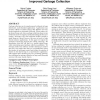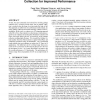20 search results - page 1 / 4 » Clustering the heap in multi-threaded applications for impro... |
GECCO
2006
Springer
13 years 8 months ago
2006
Springer
Garbage collection can be a performance bottleneck in large distributed, multi-threaded applications. Applications may produce millions of objects during their lifetimes and may i...
OOPSLA
2005
Springer
13 years 10 months ago
2005
Springer
Currently, the most adopted criterion to invoke garbage collection is heap space exhaustion. In other words, garbage collection is invoked when the heap space (either the entire s...
OOPSLA
2007
Springer
13 years 10 months ago
2007
Springer
To date, the most commonly used criterion for invoking garbage collection (GC) is based on heap usage; that is garbage collection is invoked when the heap or an area inside the he...
IWMM
2011
Springer
12 years 7 months ago
2011
Springer
To achieve optimal performance, garbage-collected applications must balance the sizes of their heaps dynamically. Sizing the heap too small can reduce throughput by increasing the...
ASPLOS
2009
ACM
14 years 5 months ago
2009
ACM
The growth in complexity of modern systems makes it increasingly difficult to extract high-performance. The software stacks for such systems typically consist of multiple layers a...


